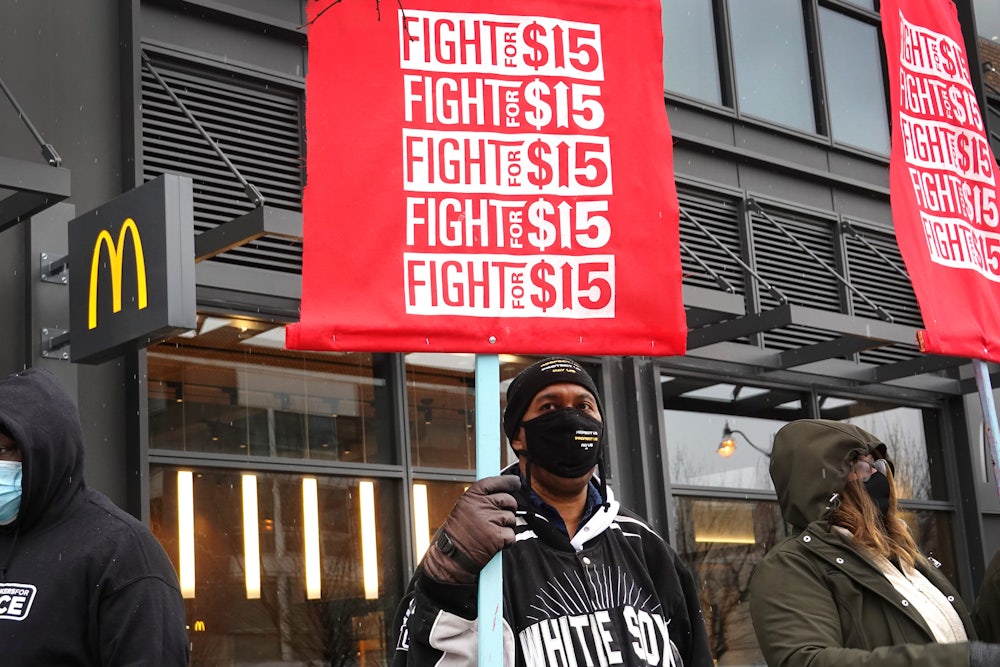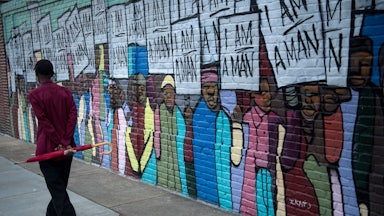The reviews for a $15 hourly minimum wage are in, and they’re brutal. “Biden’s $15 Wage Bid Hits Headwind,” says Bloomberg. “Don’t Expect a $15 Minimum Wage: Goldman Sachs,” warns Yahoo!Money. “Raising Minimum Wage to $15 Would Cost 1.4 Million Jobs,” reports CNBC, which also says a $15 minimum would increase the budget deficit by $54 billion. Both estimates are from the Congressional Budget Office.
Some of this gloom derives from President Joe Biden’s prediction Friday that the final Covid stimulus bill won’t include the minimum wage hike because of arcane Senate rules that determine what can and cannot be included in a “reconciliation” bill. “I put it in, but I don’t think it’s going to survive,” Biden told Norah O’Donnell of CBS News.
Mostly, though, the bad press for the $15 minimum derives from that CBO report. But don’t despair. The 1.4 million jobs lost and $54 billion added to the deficit are not as bad as you might suppose. And the CBO report contains some really excellent news about income inequality.
Let’s start with the job loss. I’m not an economist, and therefore I’m not equipped to judge the CBO’s work on technical grounds. (Usually it’s judged to be pretty good.) But the question of whether raising the minimum wage eliminates any jobs at all is not a settled one. Some studies show that it does, because an employer who must pay more to hire a new worker will compensate by hiring fewer of them. Other studies show that it doesn’t eliminate jobs, because the increase in the price of new hires is offset by reduced turnover and/or a better quality of worker, thereby boosting productivity—or because the cost can be passed on to the consumer without slackening demand.
What compounds the difficulty of predicting job effects is that different variables will likely produce different outcomes. What’s the unemployment rate? How much is the increase, and how abruptly is it put into effect? The increase, in this case, is substantial: The hourly minimum wage right now is a miserly $7.25. On the other hand, the Covid bill would phase in the increase to $15 over five years, which seems like a pretty long time. If you believe Larry Summers’s claim (about which I’m agnostic) that the Covid bill risks creating an inflationary spiral, that should make you more amenable to the bill’s minimum wage provision. That’s because a large increase in the inflation rate would reduce substantially the bite that the minimum wage hike took out of employers.
Another consideration is that the CBO’s estimate of 1.4 million lost jobs covers a period of 10 years. We lost more jobs than that just in the past year. From this longer-term vantage, the loss of 1.4 million jobs works out to a decline of not quite 1 percent. This means that a minimum wage hike would have a much smaller impact on whether employment rises or falls over the next decade than any number of other economic variables that we can’t possibly predict.
The $54 billion increase in the deficit, similarly, would occur over a period of 10 years, so it works out to $5.4 billion per year. At a time when Congress is getting ready to pass a $1.9 trillion stimulus bill, and when the Republican alternative is a $618 billion stimulus bill, and when one month ago President Donald Trump passed a $900 billion stimulus bill, it seems awfully squeamish to fret about $5.4 billion.
Perhaps you’re wondering why a minimum wage increase would have any effect at all on the budget deficit. The answer is that any increase in the price of labor is going to have all sorts of contradictory impacts on federal spending. That’s because the federal government purchases goods and services that are dependent on the price of labor—but also spends money to support people who are unemployed or underemployed. An increase in unemployment, assuming it occurred, would mean, over 10 years, $31 billion more for unemployment insurance, but the minimum wage hike would reduce spending on food stamps by $10 billion during the same period.
A useful example of the contradictory ways that a minimum wage hike can affect federal spending is Medicaid, the federal health care program for low-income people. On the one hand, the wage hike would reduce the number of people in poverty by nearly one million. That’s good news in itself, so let’s pause to say: Hallelujah! But also, in lifting so many people out of poverty, the minimum wage hike would render many of them ineligible for Medicaid. That, in turn, would be good news in the sense that the public cost of the Medicaid program would go down but also bad news if these no-longer-poor individuals found themselves unable to afford subsidized Obamacare (whose cost would also rise, assuming the program were still around).
Overall, the minimum wage hike would increase the cost of Medicaid by about $16 billion because the program depends on an army of low-wage health care workers employed by doctors, hospitals, or the patients themselves. I was shocked to learn, in reading the CBO report, that there are even a few people employed directly by the federal government who are paid at or near the minimum wage; the report doesn’t identify them. Apparently, some postal employees, who technically don’t work for the federal government, also work at or near minimum wage.
I left the best news for last. Even though the net cost to the federal government of raising the minimum wage would be $54 billion per year, that calculation includes a 10-year increase in tax revenue of $19.7 billion. Pay people more, and they pay more in taxes. A minimum wage hike is good news for the Internal Revenue Service!
But I can hear you supply-siders out there asking whether that gain is offset by lower tax revenues from the wealthy. The short answer is “not really.” The CBO believes that, ultimately, the bill for a minimum wage hike would be paid by higher-income people. According to a blog post by several economists at the left-leaning Economic Policy Institute, income losses would be concentrated, under the CBO’s analysis, on families whose average income is $232,800 (actually a little bit more, because that’s in 2018 dollars).
Wealthier people pay more in taxes than poor people, at least in theory. Why, then, does the CBO project that fewer tax dollars from the affluent and more from lower-income people would bring in more tax dollars? Because the minimum wage hike would shift the proportion of national income toward labor and away from capital, reversing, at least slightly, a very bad long-term trend. Even as capital has been claiming a larger share of national income, taxation on capital has, since 1990, been falling. “Labor income tends to be more heavily taxed” is how CBO explains it. More labor income, more tax revenue.
The economists Emmanuel Saez and Gabriel Zucman described the 30-year shift in taxation toward labor and away from capital more bluntly in their 2019 book, The Triumph of Injustice: How the Rich Dodge Taxes and How to Make Them Pay. “Capital income,” they wrote, “in varying degrees, is becoming tax-free.”
From the 1940s to the 1980s, Saez and Zucman noted, the average effective tax rate on capital income exceeded 40 percent, while the average effective tax on labor was less than 25 percent. Now effective taxes on both lie between 20 and 30 percent—and under Trump, taxation on labor income exceeded taxation on capital income for the first time since detailed record-keeping began in 1915. This didn’t attract nearly as much comment as it ought to have.
Now it’s a new day. EPI’s economists note that “a higher minimum wage is extraordinarily effective in redistributing income from those with very high incomes towards low-wage workers.” Given that the Covid bill would, after 2025, index the minimum wage to inflation, this redistribution would be permanent. Again, let us pause to say: Hallelujah! If the minimum wage hike gets bounced from the Covid bill, let’s get it on the Senate floor before the plutocrats have a chance to find out.








